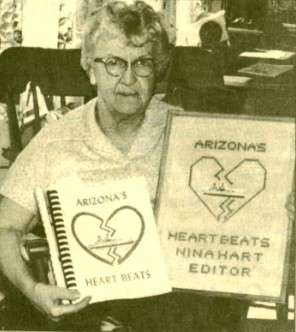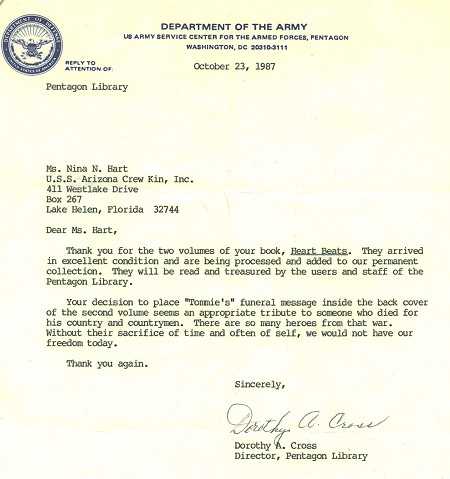
|
In Honor of
Nina N. Hart |

West Volusion's Pearl Harbor history
keeps memories alive.
(From the DeLand Sun News, Monday,
December 7, 1987)
Civilians who were old
enough to know what was happening on Dec. 7, 1941, can probably
tell you exactly what they were doing the moment they found out
that the U.S. Pacific Naval Fleet in Pearl Harbor, Hawaii, had
been bombed by the Japanese.
Lila Klock of DeLand remembers all too well. "I was flying
a kite out of a convertible in Daytona when the announcement
came over the radio," she said. "We all sat down in our seats
and came home. Pearl Harbor had been 30 million miles removed
from us and all of a sudden it was our next-door neighbor."
Klock's sentiments reflect the attitude of many who were
touched by the loss of some 1,200 men killed aboard the U.S.S.
Arizona that day. More directly affected by the news was Klock's
sister, Nina Hart of Lake Helen, who fiancée was stationed at
Pearl Harbor.
Fortunately, Fred Hart was not on the Arizona when it was
bombed, but he helped pull survivors from the wreckage. He and
Nina were married after the war, and he died here 22 years ago.
Nina Hart now is considered the country's foremost
authority on memorabilia from U.S.S. Arizona, having compiled
letters and reminiscences of men who were aboard the ship.
Copies of her two books are now housed in the Pentagon, the
Arizona Memorial Cemetery at Pearl Harbor, at the Navy Memorial
in Washington and at a University of Arizona museum.
"I realized that every time a survivor died, a story was
lost forever," said Hart, who saw the memorial in Hawaii with
the U.S.S. Arizona Reunion Association. "In 1984 I put an ad in
the Fleet Reserve Magazine asking for stories from survivors and
was overwhelmed by the response."
Hart typed all the correspondence she received verbatim and
compiled a 143-page book that year. Her efforts were rewarded
with a deluge of mail from people who had see the book and
wanted their memories to be included, too.
The 1985 edition of "Arizona's Heart Beats" is 306 pages
long, and includes a story from the last man rescued from the
boat, a man who built a small-scale replica of the Arizona, and
a transcribed story sent in by a woman whose father had started
an account of the bombing, but died before he could complete it.
Also included in the book are news clippings, photos of the
reunions, and explanations of ship terminology. According to
Hart, nothing else on this scale has been compiled about the
Arizona. She was even contacted by a woman in Hollywood who is
producing a documentary on the subject but was bemoaning the
lack of available research materials.
Hart was also recognized for her efforts on television and
was given a plaque by the president of the University of
Arizona. But her greatest honor, she said, was receiving the
letter from the Pentagon asking for copies of her book.
Klock said that her sister "gets more letters than anybody
I know -- letter of appreciation and people asking for
information. This book is a wonderful accomplishment and should
be required reading in every high school history class."
But self-recognition wasn't the purpose of Hart's labor
of love. Her comment at the end of the book says it all: "These
stories are published to show what our shipmates did and their
attempts to save the ship and help the wounded and injured...we
all owe a great deal to those who gave their best efforts in the
impossible situation without regard to their safety or
welfare...the loyalty and dedication these men displayed proves
more and more the ture meaning of the standard, 'shipmate!"

|
Copyright © 2002-2018 Lorraine Marks-Haislip
|

